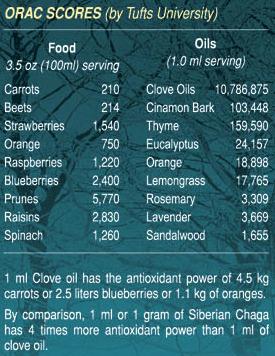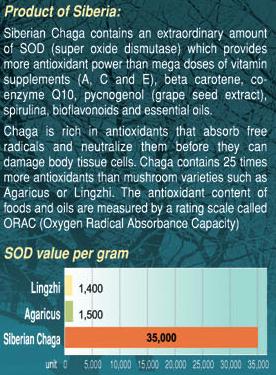CHAGA ANTIOXIDANTS
Understanding Antioxidants
Antioxidants are molecules that prevent or slow down the oxidation of other molecules. Oxidation is a chemical reaction where electrons are transferred from one substance to an oxidizing agent, leading to the production of free radicals. These free radicals can initiate chain reactions that damage cells. Antioxidants halt these chain reactions by neutralizing the free radicals, effectively preventing further oxidation.
The Role of Antioxidants in Aging and Health
As we age, our bodies experience a decrease in healthy cells and the reserve capacity of our organs. This reserve capacity is crucial for our body's ability to respond to stress and maintain health, a concept known as glucose tolerance, which also diminishes with age.
The aging process is often linked to oxidative damage, which occurs when there's an imbalance between the production of reactive oxygen species and the body's ability to detoxify these harmful compounds or repair the damage they cause. Antioxidants are vital in combating oxidative damage and protecting our cells.
The Importance of Antioxidants
A high intake of antioxidants is essential for a long and healthy life. Research suggests that the amount of antioxidants needed might be higher than the Recommended Daily Allowances (RDAs).
How Antioxidants Work
To understand how antioxidants work, consider how a sliced apple turns brown when exposed to air. This browning is oxidative damage. However, if you coat the apple slice with lemon or orange juice, the vitamin C in the juice acts as an antioxidant and slows down the oxidation process. Similarly, antioxidants in our bodies protect cells and organs from free radical damage, support the immune system, and increase resistance to stress.
What Are Free Radicals?
Free radicals are highly unstable molecules that can damage cells. They seek stability by stealing electrons from other molecules, which can turn those molecules into free radicals themselves, starting a chain reaction. This process can disrupt cell structures and lead to poor health.
The Balance Between Antioxidants and Free Radicals
The balance between antioxidants and free radicals is crucial for health. Free radicals can be generated by various sources, including smoking, pollution, radiation, and certain cooking methods like frying or barbecuing. They can also be produced internally and can alter cell structures. Exposure to pesticides and chemicals in processed foods also increases free radical production.
Key Points
- Antioxidants: Molecules that prevent cell damage by neutralizing free radicals.
- Oxidation: A process that produces free radicals, leading to cell damage.
- Free Radicals: Unstable molecules that cause cellular damage by seeking to stabilize themselves.
- Sources of Free Radicals: Smoking, pollution, radiation, frying or barbecuing food, pesticides, and chemical food processing.
The Importance of Antioxidants
Maintaining a good intake of antioxidants can significantly improve how we feel and how well our bodies cope with everyday stress.
Understanding Free Radicals and Hydrogenation
For example, when harmless seed oil is turned into solid fat like margarine through hydrogenation, the nutrients in the original food are largely destroyed. Heating these processed oils, whether solid or liquid, produces free radicals known as trans fats, which are harmful to our health. While a limited number of free radicals help the immune system destroy foreign invaders, excessive amounts can cause significant harm.
Neutralizing Free Radicals with Chaga
It's challenging to avoid free radicals and oxidative damage completely, but managing free radicals is possible. Antioxidants neutralize free radicals by donating an electron, halting the chain reaction without becoming free radicals themselves. They act as "hunters," preventing molecular and cellular damage. Scientific research, such as the study by Cui, Kim, and Park (2003), confirms that Siberian chaga, with its high antioxidant concentration, can "search and destroy" free radicals, protecting cells from oxidative stress.
The Power of ORAC
ORAC (Oxygen Radical Absorbance Capacity) is an analytical tool developed to estimate the antioxidant capacity of substances, becoming a standard in the natural products industry. As shown in the table below, wild Siberian chaga has superior ORAC values compared to other medicinal mushrooms and popular antioxidant juices on the market.
 |
 |
Superoxide dismutase (SOD), also known as the chromogenic complex in the Russian Pharmacopeia, is one of the body's most crucial antioxidants. SOD levels naturally decrease with age, but maintaining a good diet and regular exercise can help sustain them. Remarkably, chaga contains significantly higher levels of SOD compared to vitamins C, E, and superfoods like barley grass, kelp, fish oils, and many aromatherapy essential oils. These SOD enzymes are vital for keeping our cell membranes supple and healthy.
In the Russian Pharmacopeia, the chromogenic complex (which includes melatonin) is the primary indicator of chaga mushroom quality. This complex ensures that chaga provides robust antioxidant protection, contributing to overall cellular health and longevity.